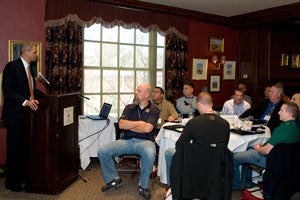Officially, it’s the “Annual Police Union Leadership Seminar,” but it’s more memorably known as “The Big 50”—Harvard Law School’s convention of police union leaders from the fifty largest cities in the United States. This April, the conference reached a milestone: its tenth anniversary. The featured speaker was U.S. Attorney General Eric H. Holder, Jr., whose appearance—initiated by the attorney general himself—marked the first time that the nation’s top law enforcer has addressed the conference.
“The federal government has failed to offer you a seat at the table,” Holder told the approximately 70 union representatives packed into the second floor library of the Harvard Faculty Club. “Things will be different now.” Holder pledged to build relationships among federal, state, and local law enforcement; discussed his three top priorities (gang violence, border security, and crime fighting in the context of economic crisis); and enumerated the fiscal supports for police in the 2009 American Recovery and Reinvestment Act.
Taking questions, Holder heard from cops in border states warding off Russian and Mexican cartels (“It’s a war zone in Texas,” said one), was asked to reexamine obsolete consent decrees, and was told he’d be held to his promise to prosecute officers based on evidence, not public pressure. Saying, “Let’s keep talking,” Holder gave the group the phone number and email address of his deputy chief of staff.
Reaction to Holder was generally positive. “Most people forget that the police are represented,” said police officer Joseph Alejandro, treasurer of the Patrolmen’s Benevolent Association of New York City. “To have the Attorney General want to speak to the leadership is pretty amazing.”
A project of the Law School’s Labor and Worklife Program, the Big 50 conference offers a unique opportunity for academics and major urban police union leaders to convene around criminal justice issues. Attendees come from across the country and represent a spectrum of unions, including the Fraternal Order of Police, the National Association of Police Organizations, the International Brotherhood of Police Officers, and the Combined Law Enforcement Associations of Texas.
Police unions have enormous responsibilities for collective bargaining, pension funds, and managing millions of dollars in contracts, particularly with law firms. But because the police are not represented by a single, nationwide union, their representatives lack access to the level of networking and training available to their unionized peers in other fields, and to the police chiefs and others who oversee them, according to Elaine Bernard, executive director of LWP [photo left]. In policy matters, police union input is seldom sought. “Criminologists often talk with chiefs and rank-and-file police, but they don’t talk to the unions, which have power and influence among members, and insight and knowledge of the life of police officers,” Bernard said. The Big 50 is an attempt to fill these gaps.
The scope of the conference has broadened over the years. “When we held our first meeting ten or so years ago, police unions considered their main task to defend members from charges by the public that they were using excessive force, etc.,” wrote Harvard economics professor and LWP faculty advisor Richard B. Freeman, in an email. “The leaders have moved to have a far more progressive stance toward what they and their members should be doing.”
“It’s become far more sophisticated,” noted Ronald G. DeLord, special counsel to CLEAT. Topics this year included racial profiling, new policing technologies, recruitment, and innovative approaches to ending gang violence. Kennedy School professor Marty Linsky’s presentation on leadership during times of economic upheaval exemplifies the Big 50’s growing emphasis on broader economic and social trends.
This year, the most buzz was generated by the novel concept of “education-based discipline.” Conceived by Los Angeles County Sheriff Leroy D. Baca, education-based discipline allows officers, in certain cases of misconduct, to choose additional training over the standard, punitive “suspension without pay” penalty that can hurt their families. The union reps loved the idea, and at least one—Sergeant Michael Scott Kreher of Atlanta—is trying to bring the idea to his police department. Kreher is national vice president of the IBPO, and president of the Atlanta PD’s Local 623. “Because of this conference, Atlanta is going to be in front of the game,” he said.
That’s exactly the kind of result the Big 50 conference is intended to foster.
